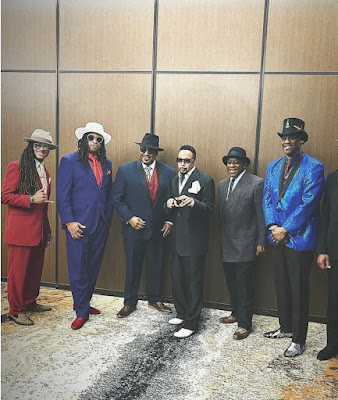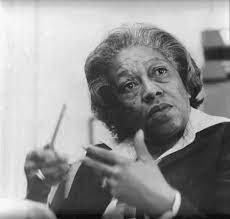April 19, 2023 Esther Phillips
Esther Phillips
Phillips was born Esther Mae Jones in Galveston, Texas, U.S. Her parents divorced during her adolescence, and she divided her time between her father, in Houston, and her mother, in the Watts section of Los Angeles. She was brought up singing in church and was reluctant to enter a talent contest at a local blues club, but her sister insisted. A mature singer at the age of 14, she won the amateur talent contest in 1949 at the Barrelhouse Club, owned by Johnny Otis. Otis was so impressed that he recorded her for Modern Records and added her to his traveling revue, the California Rhythm and Blues Caravan, billed as Little Esther. She later took the surname Phillips as her stage name, reportedly inspired by a sign at a gas station.
Her first hit record was "Double Crossing Blues", with the Johnny Otis Quintette and the Robins (a vocal group), released in 1950 by Savoy Records, which reached number 1 on the Billboard R&B chart. She made several hit records for Savoy with the Johnny Otis Orchestra, including "Mistrusting Blues" (a duet with Mel Walker) and "Cupid's Boogie", both of which also went to number 1 that year. Four more of her records made the Top 10 in the same year: "Misery" (number 9), "Deceivin' Blues" (number 4), "Wedding Boogie" (number 6), and "Far Away Blues (Xmas Blues)" (number 6). Few female artists performing in any genre had such success in their debut year.
Phillips left Otis and the Savoy label at the end of 1950 and signed with Federal Records. But just as quickly as the hits had started, they stopped. She recorded more than thirty sides for Federal, but only one, "Ring-a-Ding-Doo", made the charts, reaching number 8 in 1952. Not working with Otis was part of her problem; the other part was her deepening dependence on heroin, to which she was addicted by the middle of the decade.
In 1954, she returned to Houston to live with her father and recuperate. Short on money, she worked in small nightclubs around the South, punctuated by periodic hospital stays in Lexington, Kentucky, to treat her addiction. In 1962, Kenny Rogers discovered her singing at a Houston club and helped her get a contract with Lenox Records, owned by his brother Lelan.
Phillips eventually recovered enough to launch a comeback in 1962. Now billed as Esther Phillips instead of Little Esther, she recorded a country tune, "Release Me", with the producer Bob Gans. This went to number 1 on the R&B chart and number 8 on the pop chart. After several other minor R&B hits for Lenox, she was signed by Atlantic Records. Her cover of the Beatles' song "And I Love Him" nearly made the R&B Top 20 in 1965. The Beatles flew her to the UK for her first overseas performances.
She had other hits in the 1960s for Atlantic, such as the Jimmy Radcliffe song "Try Me", which featured a saxophone part by King Curtis (and is often mistakenly credited as the James Brown song of the same title), but she had no more chart-toppers. Her heroin dependence worsened, and she checked into a rehabilitation facility. There she met the singer Sam Fletcher. While undergoing treatment, she recorded some sides for Roulette in 1969, mostly produced by Lelan Rogers. On her release, she returned to Los Angeles and re-signed with Atlantic. Her friendship with Fletcher resulted in a performance engagement at Freddie Jett's Pied Piper club in late 1969, which produced the album Burnin'. She performed with the Johnny Otis Show at the Monterey Jazz Festival in 1970.
One of her biggest post-1950s triumphs was her first album for the Kudu label, From a Whisper to a Scream, in 1972. The lead track, "Home Is Where the Hatred Is", an account of drug use written by Gil Scott-Heron, was nominated for a Grammy Award. Phillips lost to Aretha Franklin, but Franklin presented the trophy to her, saying she should have won it instead.
In 1975, she released a disco-style update of Dinah Washington's "What a Diff'rence a Day Makes", her biggest hit single since "Release Me". It reached the Top 20 in the United States and the Top 10 in the UK Singles Chart.[8] On November 8, 1975, she performed the song on an episode of NBC's Saturday Night (later called Saturday Night Live) hosted by Candice Bergen. The accompanying album of the same name became her biggest seller yet, with arranger Joe Beck on guitar, Michael Brecker on tenor sax, David Sanborn on alto sax, Randy Brecker on trumpet, Steve Khan on guitar and Don Grolnick on keyboards.
She continued to record and perform throughout the 1970s and early 1980s, completing seven albums for Kudu/CTI and four for Mercury Records, which signed her in 1977. Her first album for Mercury, You've Come a Long Way, Baby, was released that year; according to Village Voice critic Robert Christgau, "using Kudu producer Pee Wee Ellis and the basic Kudu formula—mixing blues and standards and rock with MOR and disco crossovers—she comes up with her most consistent album of the '70s."
In 1983, she charted for the final time with "Turn Me Out" which reached number 85 on the R&B chart. She completed recording her final album, A Way To Say Goodbye a few months before her death; it was released by the Muse jazz label in 1986.
Phillips was twice nominated for the Rock and Roll Hall of Fame, in 1986 and 1987, but was not inducted.
Sadly, she passed away in 1986 and rests at Forest Lawn, Hollywood Hills.
RIP Ms. Phillips
I love, love, love her voice
.jpeg)



Comments
Post a Comment